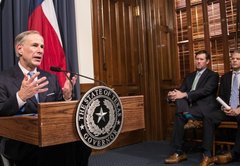Require state elected officials to disclose more about personal sources of income, contracts
Greg Abbott
"I'm proposing that all state elected officials be required to disclose more about their sources of income and to disclose any contracts they, or their family members, have with state agencies or local government bodies."
Abbott-O-Meter
Promise Kept

